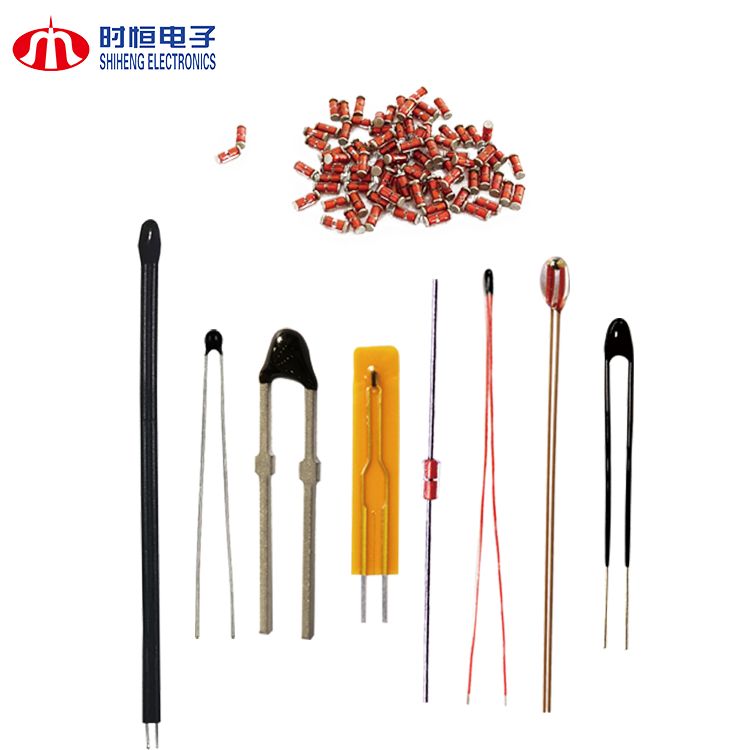Wie wirkt sich die Materialwissenschaft des Thermistors auf die Sensorleistung aus?
May 14, 2025Wie beeinflusst die Materialwissenschaft des Thermistors die Sensorleistung? Bei der Temperaturmessung konzentrieren sich die meisten Ingenieure auf die Anwendung, die Genauigkeit oder das Gehäusedesign. Aber hinter jedem Hochleistungsthermistor liegt eine oft übersehene Grundlage: das Keramikmaterial selbst. Egal, ob Sie für die Automobilindustrie, die Medizintechnik oder industrielle Systeme entwickeln, das Verständnis der Materialwissenschaft hinter Thermistoren kann der Schlüssel zu besserer Leistung, längerer Lebensdauer und konsistenteren Ergebnissen sein.
Warum ist die Keramikzusammensetzung wichtig?
NTC-Thermistoren bestehen typischerweise aus gesinterten Metalloxiden – meist einer Kombination aus Mangan-, Nickel-, Kobalt- und Kupferoxiden. Die spezifischen Verhältnisse und Kornstrukturen dieser Materialien wirken sich direkt aus:
Bei Nanjing Shiheng haben wir stark in fortschrittliche Keramikformulierungen und Sintertechnologien investiert, um Thermistoren zu entwickeln, die unter extremen Bedingungen eine zuverlässige, hochpräzise Leistung liefern.

Wichtige Innovationen bei Thermistormaterialien. Hier sind einige der Materialverbesserungen, die das Verhalten von Thermistoren direkt beeinflussen:
1. Pulveraufbereitung im Nanometerbereich. Unser firmeneigenes Verfahren erzeugt ultrafeine Keramikpulver mit gleichmäßiger Partikelgröße und gewährleistet:
2. Automatische Sinterkontrolle. Präzisionsgesteuerte Sinterprozesse führen zu:
3. Angepasste Keramik-Elektroden-Schnittstellen. Eine schlecht angepasste Elektrode kann Kontaktwiderstand oder Langzeitdrift verursachen. Unsere Thermistoren nutzen eine optimierte Metallisierung, um Folgendes zu erreichen:

Wie wirkt sich dies auf die Leistung aus?
So lassen sich unsere Materialwissenschaften in praktische Vorteile umsetzen:
Parameter | Auswirkungen fortschrittlicher Materialien |
Widerstandstoleranz | ±1 % oder besser, auch bei hohen Lautstärken |
Temperaturgenauigkeit | ±0,1 °C (0–70 °C); bis zu ±0,01 °C bei Präzisionsmodellen |
Haltbarkeit | Über 100.000 thermische Zyklen ohne Ausfall |
Automobil-Qualifizierung | AEC-Q200-zertifiziert für MF51, MF52, MF58, MF59-Serie |
Umweltbeständigkeit | 85 °C/85 % relative Luftfeuchtigkeit + kochendes Wasser + Spannungstests bestanden |
Entwickelt für die Anforderungen der modernen Industrie. Hochleistungsthermistoren basieren auf Hochleistungsmaterialien. Ob Sie einen medizinischen Temperaturfühler, ein Batterieüberwachungssystem für Elektrofahrzeuge oder eine Temperaturkompensationsschaltung für IoT-Geräte entwickeln – die Keramik ist entscheidend.
Möchten Sie den wesentlichen Unterschied in Aktion sehen? Kontaktieren Sie uns für Muster, Datenblätter oder eine individuelle Entwicklungsberatung.